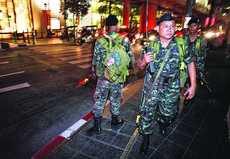Professor offers input for drafting Thai constitution

Jan 18, 2007
Last updated on May 12, 2016 at 07:05 a.m.
Ten years ago, when the government of Thailand drafted its latest constitution, one primary concern was keeping the military out of politics.
The eventual result was the exact opposite.
On Sept. 19, 2006, military leaders in Thailand seized the government from Prime Minister Thaksin Shinawatra in a bloodless coup. At the time, the prime minister was in America attending U.N. meetings. Now, Americans are going to Thailand.
One of these Americans is Thomas Ginsburg, professor of law and political science at the University. The purpose of his January visit to Thailand was to inform government officials about international constitutions – both historical and current – and to present trends that might assist these officials in the conception of a new constitution. Ginsburg explained that his presentations provided facts for consideration, not absolute rules or regulations.
Get The Daily Illini in your inbox!
“(Drafting a constitution) is a process of adaptation, and not just a copy,” he said. “(But) it’s important to know what other countries have done.”
On Jan. 5 and 6, Ginsburg spoke at a seminar on constitutional drafting for King Prajadhipok’s Institute, one of Thailand’s most influential research organizations. Before that, on Jan. 3 and 4, he gave several similar presentations in front of varied audiences such as foreign diplomats and college students.
“(Thailand) wants to set up a political institution that can provide stability,” Ginsburg said. “This will be its 18th constitution since 1932.”
Ginsburg is also working on “The Comparative Constitutions Project” with Zachary Elkins, assistant professor of political science. The project is a collection of data on 758 constitutions used since 1789, the year in which the U.S. Constitution took effect.
“(The project) aims to see what countries have decided to put in their constitutions and to see what effect (these constitutions) have had,” Elkins said. “We are collecting data on the change of constitutions across time.”
Elkins explained that the final product will be relevant to diverse professionals including historians, political scientists and officials who are writing new constitutions in developing countries.
So far, Elkins and Ginsburg have finished data collection on constitutions that are in use today.
They are in the midst of researching historical constitutions, which will be followed by an analysis of all their data. The project will be completed in about two years, Elkins said.
In completing its own constitutional project, the government of Thailand is working on a much shorter timeline. The goal of the Constitutional Drafting Council is to enact a new constitution within a year of the Sept. 19 coup, and any Thai constitution requires the vote of the people for permanence.
Part of this rapid drafting process, said Ginsburg, is due to the declining health of 79-year-old King Bhumibol Adulyadej, Thailand’s constitutional monarch, and the desire to establish national stability before his death.
As for content, Ginsburg said the new constitution will be heavily based upon a historical constitution, but not necessarily a foreign one.
“You’re going to have a document that looks similar to (Thailand’s 1997 constitution),” he said. “That’s my prediction.”





